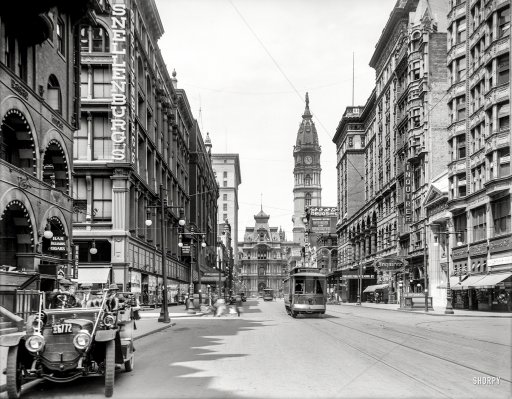
DPC City Hall and Market Street and west from 11th, Philadelphia 1912

Too late to take away the punch bowl. It’s set to end up on the floor in a thousand pieces when someone knocks it over.
• S&P Issues ‘Crexit’ Warning as Corporate Debt to Swell to $75 Trillion (CNBC)
Corporate debt is projected to swell over the next several years, thanks to cheap money from global central banks, according to a report Wednesday that warns of a potential crisis from all that new, borrowed cash floating around. By 2020, business debt likely will climb to $75 trillion from its current $51 trillion level, according to S&P Global Ratings. Under normal conditions, that wouldn’t be a major problem so long as credit quality stays high, interest rates and inflation remain low, and there are economic growth persists. However, the alternative is less pleasant should those conditions not persist. Should interest rates rise and economic conditions worsen, corporate America could be facing a major problem as it seeks to manage that debt.
Rolling over bonds would become more difficult should inflation gain and rates raise, while a slowing economy would worsen business conditions and make paying off the debt more difficult. In that case, a “Crexit,” or withdrawal by lenders from the credit markets, could occur and lead to a sudden tightening of conditions that could trigger another financial scare. “A worst-case scenario would be a series of major negative surprises sparking a crisis of confidence around the globe,” S&P said in the report. “These unforeseen events could quickly destabilize the market, pushing investors and lenders to exit riskier positions (‘Crexit’ scenario). If mishandled, this could result in credit growth collapsing as it did during the global financial crisis.” In fact, S&P considers a correction in the credit markets to be “inevitable.” The only question is degree.
[..] “Central banks remain in thrall to the idea that credit-fueled growth is healthy for the global economy,” S&P said. “In fact, our research highlights that monetary policy easing has thus far contributed to increased financial risk, with the growth of corporate borrowing far outpacing that of the global economy.” Between now and 2020, debt “flow” is expected to grow by $62 trillion – $38 trillion in refinancing and $24 trillion in new debt, including bonds, loans and other forms. That projection is up from the $57 trillion in new flow S&P had expected for the same period a year ago. [..] China is expected to account for the bulk of the credit flow growth, with the nation projected to add $28 trillion or 45% of the $62 trillion expected global demand increase. The U.S. is estimated to add $14 trillion or 22%, with Europe adding $9 trillion, or 15%.

“Buying stocks for their yield because bonds are at their lowest yields in 5000 years is like switching to cigarettes from crack for health purposes.”
• The Entire Market is Driven by a “Once in History” Bubble About to Burst (P.)
Since QE 3 ended in October 2014, stocks have traded in a large range between roughly 2,130 and 1800 on the S&P 500.
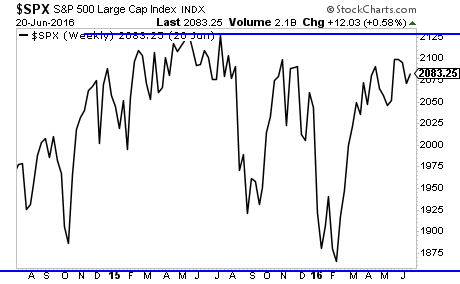
During this time, whenever stocks began to breakdown in a serious way, a clear intervention was staged in which someone manipulated the markets higher. Regardless of whether you are a bull or a bear, none of those rallies felt normal or sane in any way. No one panic buys every single day at the exact same time for days on end. Which brings us to today. Stocks have broken out of the trading range to the upside hitting new all-time highs.
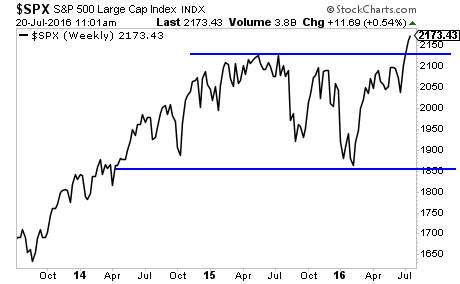
They are doing this despite the US entering a recession, China continuing to devalue the Yuan, Italy facing a banking crisis, etc. The explanation the bulls are giving for the breakout is that stocks supposedly hitting all time highs because with $13 trillion in bonds posting negative yields, stocks’ 2.4% or so in dividends are extremely attractive from a yield perspective. Yes, we’ve reached the point at which investors are buying stocks for yield and bonds for capital gains. This is extremely problematic in that it implies that all equity purchases are being driven by a “once in history” bond bubble.• German bond yields are negative out to nearly 10 years. • Japanese bond yields are negative out to 10 years. • Swiss bond yields are negative out to 50 years.
These are completely unsustainable developments. Buying stocks for their yield because bonds are at their lowest yields in 5000 years is like switching to cigarettes from crack for health purposes. At some point something will break in the bond markets. Central Banks are attempting to corner the asset class that is the benchmark for the risk-free rate globally. Put another way, investors are willing to PAY for the right to lend to these Governments for up to and even over a decade. At some point something is going to break here. When it does, stocks will implode below the 2008 lows. It’s only a matter of time.

It’s not fair! They promised us the sky would fall…
• Bank Of England Report Finds Economy Has Not Slowed Since Brexit Vote (G.)
Theresa May’s new administration has received a significant boost from a Bank of England report showing that the economy has been resilient in the first few weeks since the Brexit vote and displays no general signs of slowing down. The monthly survey by the Bank’s regional agents – considered to be the “eyes and ears” of policymakers in Threadneedle Street – found that a majority of firms questioned were not planning to mothball investment or change hiring plans. Even so, City analysts said the Bank was still likely to announce fresh stimulus measures for the economy next month in anticipation that the better-than-expected economic news since the referendum would not last.
Howard Archer, chief UK economist at IHS Global Insight, said: “While there may be some relief that the economy may have dodged an immediate sharp slowdown from the Brexit vote, the danger is still very much there given the major uncertainty that is apparent – and there seems a compelling case for the Bank of England to deliver a substantial package of measures at its August meeting to try and bolster business and consumer confidence” The agents’ report was released at the same time as the Office for National Statistics reported that the labour market remained solid in the period from March to May, the first three months of the referendum campaign, with the jobless rate falling to its lowest level in more than a decade.

Question: why did this talke so long?
• US Links Malaysia PM, Wolf of Wall Street to Millions Stolen From 1MBD (WSJ)
U.S. prosecutors have linked the prime minister of Malaysia, a key American ally in Asia, to hundreds of millions of dollars allegedly siphoned from one of the country’s economic development funds, according to a civil lawsuit seeking the seizure of more than $1 billion of assets from other people connected to him. The Justice Department filed lawsuits Wednesday to seize assets that it said were the result of $3.5 billion that was misappropriated from 1Malaysia Development Bhd., or 1MDB, a fund set up by Prime Minister Najib Razak in 2009 to boost the Malaysian economy. The move sets up a rare confrontation between U.S. prosecutors and an important partner in the fight against terrorism.
The moderate Muslim nation is also a counterpoint to China’s rising ambitions in Asia. Among the Justice Department’s assertions: That some $1 billion originating with 1MDB was plowed into hotels; luxury real estate in Manhattan, Beverly Hills and London; fine art; a private jet and the 2013 film “The Wolf of Wall Street.” Among those behind the spending, the lawsuit alleges, was Riza Aziz, stepson of Mr. Najib. N�o� �c�r�i�m�i�n�a�l� �c�h�a�r�g�e�s� �w�e�r�e� �f�i�l�e�d�.� The Malaysian people were defrauded on an enormous scale, said Deputy FBI Director Andrew McCabe at a news conference announcing the complaints. The asset seizure would be the largest ever by the Justice Department’s anticorruption unit.

Excuse me, but how did Goldman Sachs end up not being mentioned?
• Singapore Finds UBS, DBS, StanChart ‘Failings’ in 1MDB Probe (BBG)
Singapore vowed to take action against four banks for failures in anti-money laundering controls and said it seized S$240 million ($177 million) in assets linked to alleged fraud at the Malaysian state investment company known as 1MDB. Preliminary findings uncovered “instances of control failings” in UBS’s Singapore branch, Standard Chartered’s local unit and DBS, as well as “substantial breaches” of anti-money laundering regulations at Falcon Private Bank in the city-state, the Monetary Authority of Singapore said in a statement Thursday. The regulator’s probe, which started in March 2015, is part of global investigations into 1Malaysia Development Bhd. that stretch across Abu Dhabi, Switzerland, the Caribbean, Hong Kong and the U.S.
More than $3.5 billion was misappropriated from the Malaysian firm, and about $1 billion laundered through the U.S. banking system, the U.S. Justice Department said Wednesday as it launched what could potentially be its biggest ever seizure for such ill-gotten gains. “Supervisory examinations of financial institutions with 1MDB-related fund flows have revealed a complex international web of transactions involving multiple entities and individuals operating in several jurisdictions,” the Singapore central bank said. “Certain financial institutions in Singapore were among those used as conduits for these transactions” and MAS will be taking actions against them, it said.

It’s really years too late to blame ratings agencies for one’s troubles.
• Erdogan Declares State Of Emergency, Warns S&P ‘Don’t Mess With Turkey’ (ZH)
Having warned earlier of the possibility, Turkish President Tayyip Erdogan on Wednesday announced a three-month state of emergency, saying this would enable the authorities to take swift and effective action against those responsible for last weekend’s failed military coup. He explicitly focused on the effort across his nation to “effectively tackle the Gulen movement,” as Erdogan stated that there might be more plans to continue coup attempts. The state of emergency, which comes into force after it is published in Turkey’s official gazette, will allow the president and cabinet to bypass parliament in passing new laws and to limit or suspend rights and freedoms as they deem necessary. The decision has immediately raised fears of more arbitrary arrests, killings and disappearances.
“The aim of the declaration of the state of emergency is to be able to take fast and effective steps against this threat against democracy, the rule of law and rights and freedoms of our citizens,” the president said. Erdogan, who has launched mass purges of state institutions since the July 15 coup attempt by a faction within the military, said the move was in line with Turkey’s constitution and did not violate the rule of law or basic freedoms of Turkish citizens. The president added that “citizens should have no concerns for democracy,” and warned ratings egency S&P “not to mess with Turkey” and comforted his citizens that a “state of emergency does not mean military rule” and that the decision was not against the constitution.
Erdogan said regional governors would receive increased powers under the state of emergency, adding that the armed forces would work in line with government orders. But most amusingly, Erdogan promptly warned S&P, which earlier today downgraded Turkey to BB, “not to mess with Turkey” and that the decision to downgrade the country was political. Finally, he lashed out at Europe, “which he said does not have the right to criticize this decision,” anticipating expressions of “concern” from the European Union, which has become increasingly critical of Turkey’s rights record and has urged restraint as Ankara purges its state institutions since the abortive coup.

Ther are people who think they can shut down WikiLeaks? What do they think the US has been trying to do for years?
• Wikileaks, About To Expose Turkish ‘Coup’, Under ‘Sustained Attack’ (TAM)
Wikileaks claimed Monday it was under attack after it announced it would release hundreds of thousands of documents related to Turkey and the failed military coup attempted Friday, CNET reported. The organization, which has released information on everything from war crimes to Hillary Clinton’s email scandal, announced Sunday it would be releasing 100,000 documents related to Turkey’s “political power structure,” some of which detail the “leadup” to the coup.
ANNOUNCE: Get ready for a fight as we release 100k+ docs on #Turkey’s political power structure. #TurkeyCoup #Soon
— WikiLeaks (@wikileaks) July 18, 2016Wikileaks anticipated the release would be censored in Turkey, cautioning in a three-part tweet posted Monday: “Turks will likely be censored to prevent them reading our pending release of 100k+ docs on politics leading up to the coup. We ask that Turks are ready with censorship bypassing systems such as TorBrowser and uTorrent and that everyone else is ready to help them bypass censorship and push our links through the censorship to come.” The Turkish government, headed by President Recep Tayyip Erdogan, has increasingly ramped up censorship efforts against journalists, lending credibility to Wikileaks suspicions their release may not fully reach Turkish citizens—especially considering the latest leak concerns his ruling party, AKP.
As CNET noted: “Facebook, Twitter and YouTube were reportedly blocked in Turkey during the attempted coup Friday, but many residents appear to have gotten around the blocks, posting messages and videos, likely using VPNs or other anonymizing services.”
Throughout Monday, Wikileaks continued to promote the release. (“Turks ask whether WikiLeaks is pro or anti-AKP. Neither. Our only position is that truth is the way forward. 100k+ docs serves all sides. – WikiLeaks (@wikileaks) July 18, 2016”). They then tweeted that instead of 100,000 documents, they would actually be releasing far more. “Our pending release of 100k docs on Turkish political power? Just kidding. The first batch is 300k emails, 500k docs,” they announced.But just hours later, they alerted followers their website was being attacked. “Our infrastructure is under sustained attack,” they tweeted, alongside the hashtag, #TurkeyPurge. “We are unsure of the true origin of the attack. The timing suggests a Turkish state power faction or its allies. We will prevail & publish,” Wikileaks tweeted shortly after.

Greece will be nervous.
• Reports Of Turkish Commandos In Greek Aegean Put Athens On Alert (Kath.)
Reports that a group of Turkish military commandos tried to cross from Turkey to the island of Symi, in the southeastern Aegean, put the Greek armed forces on alert on Wednesday amid fears that ties between Greece and Turkey could be tested in the wake of a failed coup in the neighboring country. The Greek Coast Guard was on alert from around 11 a.m. when a group of inflatable dinghies and other vessels were seen departing from Datca, on the Turkish coast, in the direction of Symi. Confused intelligence referred to the presence of around 20 Turkish commandos on those vessels. Athens had been anticipating a possible attempt by participants in the failed coup to come to Greece and so took the reports seriously.
Later in the day, citing Turkish military officials, Reuters reported that Turkish F-16 fighter jets were scrambled to check reports that missing Turkish coast guard vessels had appeared in Greek waters in the Aegean. Some Turkish military hardware was stolen and used in the failed coup but Turkish government officials have insisted that no military equipment remains unaccounted for. Later on Wednesday, the Turkish interior ministry denied claims that rebel soldiers might have “hijacked” a vessel to flee to Greece, Reuters reported. Sources of the Hellenic Air Force confirmed that two Turkish F-16s had conducted patrols but they said they remained in Turkish air space. The Greek Coast Guard monitored the movements of the Turkish vessels, which remained in Turkish waters. Also, a contingent of the Greek Police was dispatched to Symi to conduct checks there.
The developments came after a statement by Foreign Minister Nikos Kotzias on the anniversary of the Turkish occupation of Cyprus prompted a terse reaction by Ankara. “Greece does not and will never accept the consequences of the Turkish invasion,” Kotzias said. “It has made it clear to all sides that the elimination of the anachronistic system of guarantees and the withdrawal of all Turkish occupation forces – which, as the recent events in Turkey confirmed, undermine rather than ensure constitutional order and democratic normalcy – are an integral part of the solution of the Cyprus problem.” The Turkish Foreign Ministry responded that linking the Cyprus situation to recent events in Turkey was “ill-intentioned” and “unfortunate,” and called on Athens to avoid trying to benefit from the events and to display good neighborly behavior.

Orlov contends that Erdogan is simply not that smart.
• A Turkey of a Coup (Dmitry Orlov)
A lot of words have already been said in the past few days about the Turkish coup that couldn’t fly, but strangely enough some rather obvious things went unmentioned, so I’ll try to fill in a few gaps. Specifically, a lot of the things that have been said range from feeble-minded to utterly preposterous. If this is propaganda, then it sounds like very bad, weak propaganda. Still, there is no shortage of people endlessly repeating these talking points, whether because they get paid to or because they don’t know better. They are the ones I want to address.
Idiotic Theory #1: Erdogan staged his own coup in order to consolidate his power. Prior to the putsch, Erdogan went on vacation, which is traditionally the best time to overthrow a leader. For example, Gorbachev’s tenure as “president” of USSR was ended by a putsch in August 1991 while he was on vacation. People who are busy staging a putsch to consolidate their power don’t go on vacations; they are too busy plotting and orchestrating. Erdogan attempted to fly back to Turkey, only to find that he couldn t land at Istanbul Ataturk, then found himself chased by hostile F-16s. He then flew toward Europe and requested political asylum in Germany, which was refused (bye-bye, Germany!). At some point it dawned on him that most of the army and virtually all of the people in Turkey were on his side, and so he called upon them to take to the streets in defense of the legitimate government.
He did this using an improvised public communications technique that was almost a mockery of itself: his face on a cell phone held in front of a television camera. What followed wasn’t some peaceful, timid demonstration in support of the status quo but gonzo political action, complete with civilians laying down in front of tanks and getting crushed, followed by other civilians jumping on top of tanks and slitting the drivers’ throats. The putsch crumbled. The optics of all of this are hard to misread. He went on vacation; he tried to flee; he begged his people for help over a cell phone. He ended up looking like a very weak and confused leader in a region where leaders either look strong or they don’t stay leaders for long. Do you still think that he planned all this? I don’t.

Demand.
• More Pain Seen For US Crude As Product Glut Adds To Gloom (R.)
A glut of refined products has worsened the already-grim outlook for U.S. crude oil for the rest of the year and the first half of 2017, traders warned this week, as the spread between near-term and future delivery prices reached its widest in five months. A stubborn, massive supply overhang punished crude over the winter as U.S. oil futures hit 12-year lows in February. As supply outages and production cuts increased, crude rallied and spreads tightened significantly in May. But the unusually large amount of gasoline and oil in storage, combined with expectations of a ramp-up in crude production, has made traders more bearish on the price outlook for late 2016 and early 2017.
West Texas Intermediate (WTI) futures for delivery in September traded at a discount of as much as $2.23 to those for delivery in December on Wednesday, the biggest this year. Turnover in that spread soared, touching a record high of more than 19,000 contracts, or about 19 million barrels of oil. December spreads, which are the most actively traded, have also blown out in the past month. The discount of the WTI December 2016 contract to December 2017 widened to $4.11 last week. On Wednesday it traded as wide as $3.92 with over 15,000 lots traded. In May that spread had narrowed to just 50 cents, the tightest since November 2014.

The craziest thing of all is foreign buyers often get credit from foreign banks, so New Zealand can only do so much; other than ban foreign buyers outright.
• New Zealand House Bubble Warning Will ‘Shake Government’ (NZH)
A top banker’s dire warning about New Zealand’s overheated house prices shows the market is in crisis and an immigration rethink is needed, Labour says. In a strongly worded opinion piece, ANZ chief executive David Hisco has warned Auckland property prices are over-cooked and the end would likely be messy. He has joined several leading establishment figures in calling for stronger action on housing, and warns yesterday’s Reserve Bank lending restrictions did not go far enough. Hisco’s comments come after Finance Minister Bill English and Housing Minister Nick Smith signalled they expected property values to slow or drop.
Both told first home buyers to ride the bubble out before buying. Labour finance spokesman Grant Robertson said Hisco’s message reflected the fact the housing market was in crisis. “This is the kind of warning from inside the system that should, if nothing else, shake the Government.” Labour policy is to ban foreign buyers, extend the “bright line” test to five years so investment properties on-sold within five years have to pay a tax on the capital gains achieved, fast-track the building of affordable homes and begin consultation on ending negative gearing.
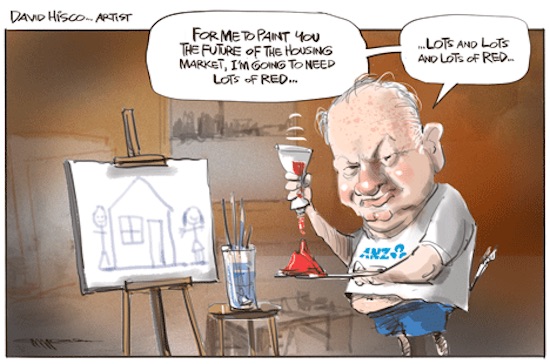
[..] NZ First leader Winston Peters said Hisco’s warning of a “messy end” was totally predictable and avoidable but had been ignored by the Government and others for too long. “There will be a correction. It is going to be enormously painful for hundreds of thousands of New Zealanders and that’s the sad part about it. Many people will lose their equity. But any conception such a build up in the house price bubble could go on shows what enormous denial the political system is in.” Peters said English and Smith were trying to stave off the inevitable. He did not believe the Reserve Banks’ moves this week to increase loan to value radios for investors from 30 to 40 per cent deposits would have much impact. “It’s crude, it’s blunt and not helpful.”

Note: this is well before the ‘Greece crisis’, and well before Syriza was elected.
• Greek Brain Drain Amounted To 223,000 People In 2008-2013 (Kath.)
A special study by the Bank of Greece on Wednesday showed that 223,000 young people left the country from 2008 to 2013 in search of a better future abroad, constituting the so-called “brain drain.” The results of recent research point to the vast majority of people aged between 25 and 39 years who left the country in the first five years of the Greek recession being single and with a university degree. The young Greeks left not only due to unemployment and adverse economic conditions but also because of state’s failure to provide and generate opportunities for professional evolution.
The Bank of Greece study revealed that the momentum and magnitude of the phenomenon makes it essential to record its characteristics and to investigate the factors that are in play before analyzing the negative consequences for the local economy. The main characteristic identified is that it mainly concerns the section of the workforce that is healthy, educated and specialized, and has high mobility and employability rate. The central bank also attributed the growth of the brain drain to the failure of the local education system to produce high-quality human capital and to the inability of the domestic economy to hold on to and attract talented workers.

It’s not the air.
• Warmer Water, Not Air, Drives Antarctic Peninsula Glacier Melt (CB)
The Antarctic Peninsula is a long, relatively narrow limb extending 800 miles out from West Antarctica, and is home to hundreds of glaciers. These rivers of ice ooze their way down through the Peninsula’s rocky mountain range and into the ocean, powered by gravity and their own weight. But of the 674 glaciers on the Peninsula’s western side, almost 90% are retreating. This happens when their ice melts faster than new snowfall can replenish it. The prevailing theory has been that warming air are melting the glaciers. But a new study, just published in Science, finds that the main cause is actually rising ocean temperatures. As the Peninsula’s glaciers are among the main contributors to sea level rise, knowing how and why they’re changing will help make predictions more accurate, the lead author tells Carbon Brief.
The Antarctic Peninsula is one of the fastest warming regions on Earth. Temperatures have risen by more than 3C over the past 50 years. The warming atmosphere has caused some remarkable changes to the eastern side of the Peninsula. The Larsen ice shelf, a floating sheet of ice formed from glaciers spilling out onto the cold ocean, has lost two of its four sections in recent decades. Larsen-A collapsed in 1995, followed by its neighbour, Larsen-B, in 2002. Rising air temperatures are also contributing to the thinning of Larsen-C, which is now at risk of collapse. Over on the western side of the Peninsula, around 600 small glaciers of various shapes and sizes have also been melting.
Scientists had thought that warming air temperatures were the likely cause of these retreating glaciers, says lead author Dr Alison Cook, a research fellow at the Durham University. She explains to Carbon Brief: “Few of these glaciers had been studied in detail and it was thought that their retreat was in response to the atmospheric warming, which has been the predominant driver on the eastern side.” However, recent research suggests the glaciers are retreating even more quickly than can be explained by just the warming atmosphere. Cook’s study finds that the main cause of glacier melt actually lies deep in the ocean – several hundred metres beneath the surface.
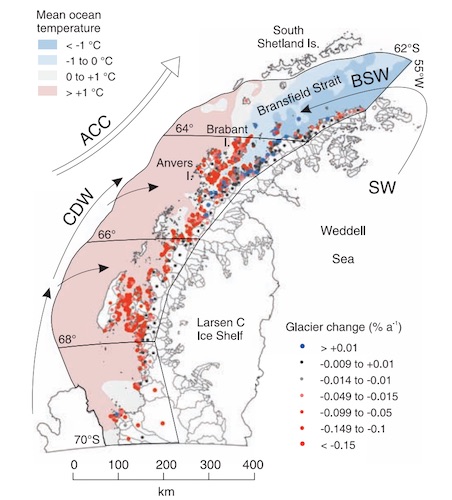
Average ocean temperatures (at a depth of 150m) and change in glacier size (in % per year) for 1945-2009 on the Antarctic Peninsula. The size and colour of the dots indicates glacier change – the larger, red dots showing the largest decrease, and the blue dots show stable glaciers that aren’t retreating. Ocean circulation and types of water mass are labelled as follows: Circumpolar Deep Water (CDW), Shelf Water (SW), Bransfield Strait Water (BSW), and Antarctic Circumpolar Current (ACC). Source: Cook et al. (2016)








